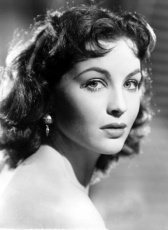Eclectic is the qualificative that best defines the career of Yvonne Furneaux. Born in Roubaix (a big industrial town in the North of France) in 1928, the little girl was immediately placed under the sign of bilingualism, her father being English and her mother French. As a result, once this alluring brunette had become an actress, she could as easily play in an English or a French film, which did not prevent her from being a regular in Italy and in West Germany, with a foray into Spain. Likewise, she could appear in any film genre, from psychological dramas (24 timer af en kvindes liv (1952), her film debut) to adventure yarns (The Master of Ballantrae (1953)), from war films (Il carro armato dell'8 settembre (1960)) to films noirs (Le meurtrier (1963), Le scandale (1967)), from sword & sandal movies (Io Semiramide (1963), Leone di Tebe (1964)) to horror movies (The Mummy (1959)), from comedies (Versuchung im Sommerwind (1972) to chillers (Repulsion (1965)). The same is true for the quality of her films, ranging from bombs (Frankenstein's Great Aunt Tillie (1984), mediocre run-of-the mill products (Die Todesstrahlen des Dr. Mabuse (1964)), average works (Io Semiramide (1963)), quite good (Lisbon (1956)), good (The Beggar's Opera (1953)), very good (In nome del popolo italiano (1971)), excellent (Polanski's Repulsion (1965), as demented Catherine Deneuve's normal sister), to an unclassifiable masterpiece (Fellini's immortal La dolce vita (1960), in which she is Mastroianni ex-wife). Such heterogeneity more or less put Yvonne Furneaux at a disadvantage, despite an undeniable acting talent and her having been chosen by great directors (Peter Brook, Michelangelo Antonioni, Federico Fellini, Claude Autant-Lara, Roman Polanski, Claude Chabrol and Dino Risi. Another reason why she is not remembered as she should be, is the fact she gave up appearing on the screens little time after marrying cinematographer Jacques Natteau in the late sixties. One should not however dismiss or forget what I would call her cold beauty, which particularly worked wonders when she played haughty women of power such as Princess Ananka (in the classic of the genre,Terence Fisher's The Mummy (1959)), Semiramide or Cleopatra. Without a doubt, Yvonne Furneaux needs better than oblivion.
